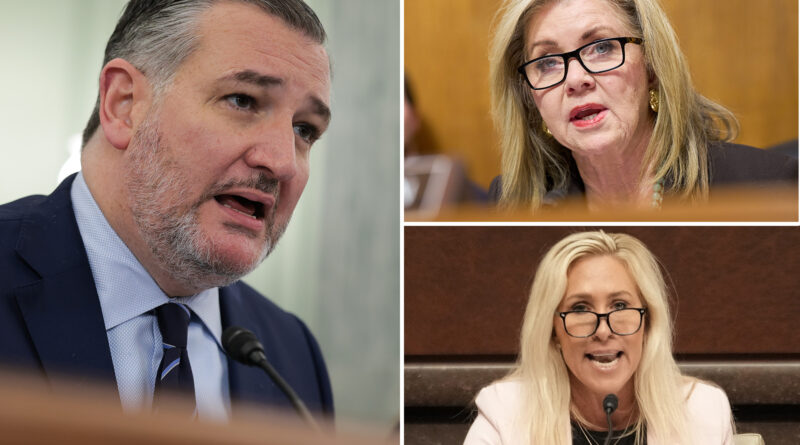Republican senators cut deal to limit state AI rules in ‘big, beautiful’ bill

Two key GOP senators reached a deal over the weekend meant to pacify a growing House Republican revolt over the extent to which states can regulate artificial intelligence in the coming years.
Under the agreement between Sen. Marsha Blackburn (R-Tenn.) and Senate Commerce Committee Chairman Ted Cruz (R-Texas), states who wish to access $500 million in AI infrastructure funding in President Trump’s One Big Beautiful Bill Act must hold off on new rules governing the technology for five years.
The deal includes carveouts to regulate child sexual abuse material, unauthorized use of a person’s likeness and other deceptive practices.
The original Senate version of the Big Beautiful Bill imposed a 10-year moratorium, which Blackburn opposed and which some House Republicans had suggested would cause them to kill the entire legislation.
“For decades, Congress has proven incapable of passing legislation to govern the virtual space and protect Americans from being exploited by Big Tech, and it’s why I continue to fight to pass federal protections for Tennesseans and Americans alike,” Blackburn said in a statement.
“To ensure we do not decimate the progress states like Tennessee have made to stand in the gap, I am pleased Chairman Cruz has agreed to update the AI provision to exempt state laws that protect kids, creators, and other vulnerable individuals from the unintended consequences of AI.”
Blackburn, who has publicly expressed interest in a run for governor of her home state next year, is far from the only Republican to have expressed concerns about the 10-year moratorium on state AI regulation.
Last week, 17 Republican governors inked a letter to Senate Majority Leader John Thune (R-SD) and House Speaker Mike Johnson (R-La.) urging them to scrap the pause completely.
Multiple House Republicans, most notably far-right Rep. Marjorie Taylor Greene (R-Ga.), claimed that the AI moratorium was a dealbreaker and demanded the Senate cut it out of the megabill.
“Full transparency, I did not know about this,” Greene admitted on X a few days after she voted for the One Big Beautiful Bill Act. “I am adamantly OPPOSED to this and it is a violation of state rights and I would have voted NO if I had known this was in there.”
A spokesperson for Greene did not immediately respond to a request for comment about whether the Blackburn-Cruz deal allays her concerns.
Big Tech had pushed to restrict states from setting up their own rules on AI, backed by the Trump White House’s crypto and AI czar, entrepreneur David Sacks.
“I’m happy to see the senators worked out a deal that allows the moratorium to move forward,” Sacks told The Post Monday.
Opponents had tried to get the AI provision out of the megabill completely via the so-called “Byrd Bath” process, in which Senate Parliamentarian Elizabeth MacDonough examined the bill to see if it complied with rules allowing it to skirt the 60-vote filibuster.
Ultimately, after Cruz’s team modified the language, the parliamentarian approved the 10-year AI moratorium, but resistance from Blackburn and others remained.
Despite the effort to reach a compromise, some critics argue that Blackburn’s deal with Cruz is unlikely to protect the state laws she sought to save.
As currently written, the bill text only provides exemptions for laws that do not impose an “undue or disproportionate burden” on AI systems, providing a loophole for Big Tech firms to argue in court that laws like Tennessee’s ELVIS Act — which bars AI systems from mimicking a person’s voice without consent — cannot stand.
“The undue burden clause basically supersedes the carve-outs. Big Tech will argue that any kids’ safety bill will cause undue burden on the entire AI system and therefore it can’t be enforced,” said one DC tech policy official who opposes the deal.
“This limits where the pushback can be,” the official said. “All of the sudden, the only people who can pass laws on AI are Congress, and it’s easier for tech to kill legislation in Congress than it is [in] state houses.”
Sacha Haworth, executive director of the Tech Oversight Project, called the Blackburn-Cruz deal “terrible.”
“At a time when new details emerge every day about Big Tech’s untested AI assistants and chatbots causing harm to people, especially kids, Congress should be encouraging more oversight, not AI amnesty,” she said.
The Senate was expected to vote on passage of the One Big Beautiful Bill later Monday, with the House set to take it up as early as Wednesday.
Congressional GOP leadership has set a goal for Trump to sign the measure into law by Friday’s July 4 holiday.
